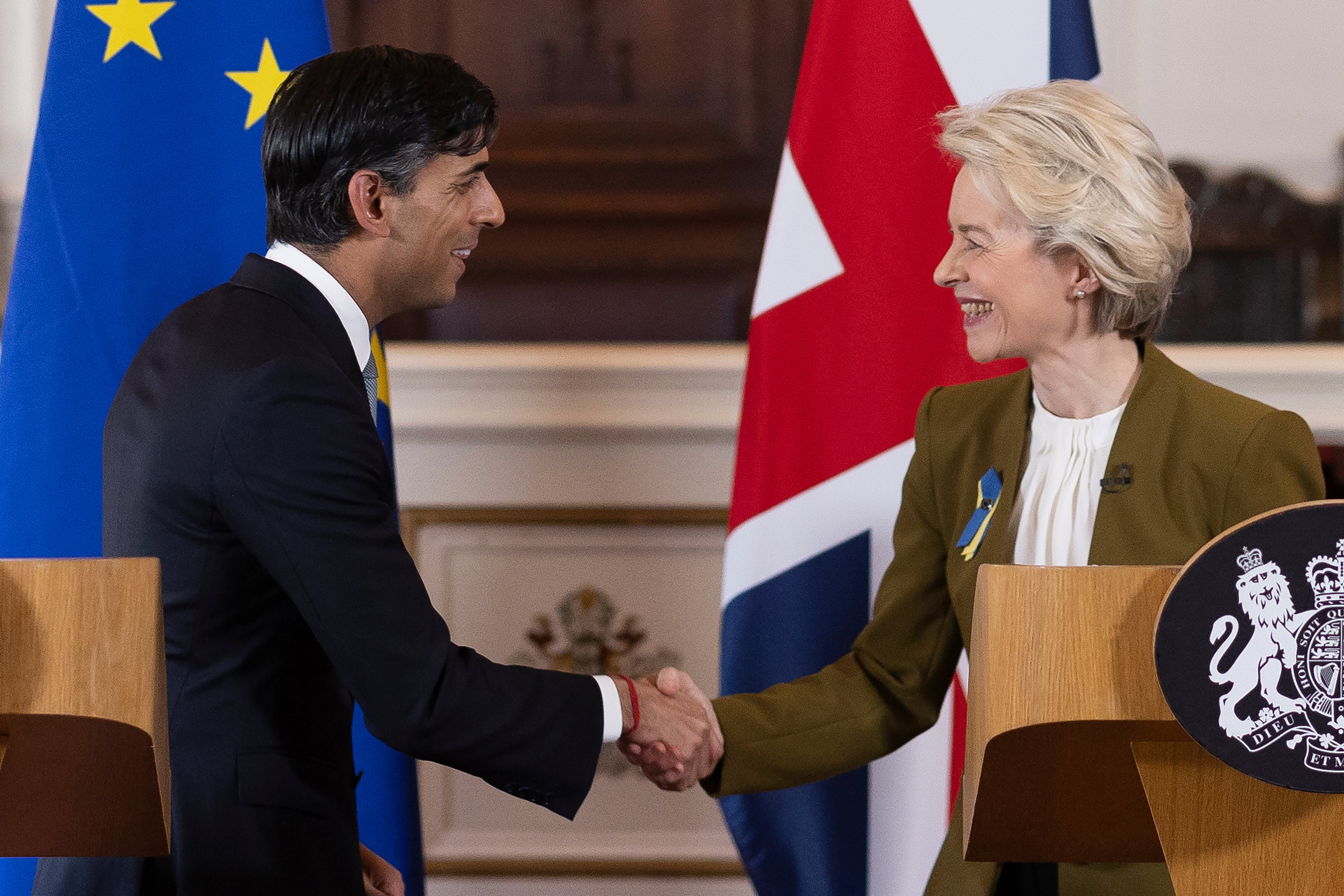Electric cars will cost drivers £6,000 more if Sunak fails to strike Brexit deal with EU
Exclusive: Manufacturers warn of ‘devastating price war’ on consumers if tariffs are enforced in 2024
Electric cars will cost British motorists an extra £6,000 if Rishi Sunak fails to strike a post-Brexit deal with the EU on tariffs, industry bosses have told The Independent.
UK manufacturers warned of a “devastating price war” on consumers – threatening both the electric vehicle (EV) market and the UK’s climate change commitments – if tariffs are enforced in January 2024.
In the latest major Brexit row, the Sunak government is pushing the European Commission to agree to delay the costly new rules set to come in at the start of next year as part of Boris Johnson’s Brexit trade deal.
But Brussels has shown no sign it is willing to budge – leaving business leaders in despair about the impact of 10 per cent tariffs on exports on Britain’s car industry.
The tariffs would increase the price of a new Tesla Model Y – the UK’s most popular electric vehicle – by £6,000 or more, according to a new report by the Independent Commission on UK-EU Relations, shared with The Independent.
“For the sake of our economy and our planet, the government has a responsibility to get round the table with the EU, fix this and fix the raft of other issues with the Brexit deal,” said commission director Mike Buckley.
The new rules of origin agreed in the Brexit trade and cooperation agreement (TCA) require 45 per cent of an electric car’s value to originate in the UK or EU to qualify for trade without tariffs.
The British auto industry has warned the 2024 rules pose an “existential threat” to sales because of the lack of domestic batteries to meet the rules – pleading for a delay until 2027.
The VDA – the lobby group for Germany’s car industry – has also called for an “urgent” move to delay, warning that the rules create a “significant competitive disadvantage” for European carmarkers in relation to China and other Asian competitors.

The new report by the Independent Commission on UK-EU Relations – backed by the manufacturers’ body Make UK and the British Chamber of Commerce – warns that the January tariffs will immediately push up costs and hit electric vehicle sales.
Richard Rumbelow, Make UK’s director of international trade, said the “price cliff edge” looming for electric cars in January could be huge. “Households could soon be paying thousands more for electric vehicles. It would be a devastating price war on consumers,” he said.
The trade expert added: “It’s imperative that the government gets round the table with the EU and sorts this situation as soon as it can. Industry needs assurance that it won’t be forced to make consumers pay even more, in these toughest of economic times.”
The trade commission, which examines the ongoing impacts of the Brexit trade deal, also warned that it could set back Mr Sunak’s hopes of achieving net zero carbon emissions by 2050.
The PM has already been accused of hurting the EV market by pushing back a ban on petrol and diesel car sales from 2030 to 2035.
The trade commission said the failure to agree an extension of the grace period would cut EV production by up to 480,000.
“That number of extra fossil fuel cars on the road would add over 807 billion grams of carbon to the atmosphere across the UK and EU,” said Mr Buckley. “Given the UK is already on track to miss climate targets on nearly every front, any further obstacle spells disaster.”
The report also called on the Sunak government to pursue a deal for the UK to remain part of the EU VAT area, so that companies do not have to pay the tax when importing goods. It also recommended an agri-food agreement to simplify border checks that would benefit the food and drink trade.

Mr Buckley said the electric car tariff problem was “just one example of how the Brexit deal is placing long-term limitations on the UK economy and making it hard to get growth, jobs and end the cost of living crisis”.
On the car tariff row, the commission director added: “This isn’t about politics – it’s about making sure that UK households get the best possible deal and aren’t left thousands out of pocket unnecessarily.”
British and EU officials met in London last month to discuss the car tariffs and other trade issues, but Brussels is reluctant to reopen any part of the existing Brexit deal.
Thierry Breton, the influential European commissioner, said it would be wrong to give in to pressure from one industry. “If something has been negotiated, it shouldn’t be changed,” he said.
It comes as Britain struggles to boost its battery production for electric cars after the collapse of manufacturer Britishvolt earlier this year. Tata Group, owner of Jaguar Land Rover, announced plans in the summer to build a £4billion battery factory in Somerset. Mr Sunak called it an “incredibly proud” moment.
Labour has promised to an agri-food deal to get closer alignment with the EU and would attempt to improve the Brexit trade deal when it comes up for a formal review in 2025.
But Sir Keir Starmer has shied away from the idea of rejoining the single market and customs union. His shadow foreign secretary, David Lammy, said earlier this week a Labour government would have to start “dating” the EU again before closer ties could be achieved.
Join our commenting forum
Join thought-provoking conversations, follow other Independent readers and see their replies
Comments



Bookmark popover
Removed from bookmarks